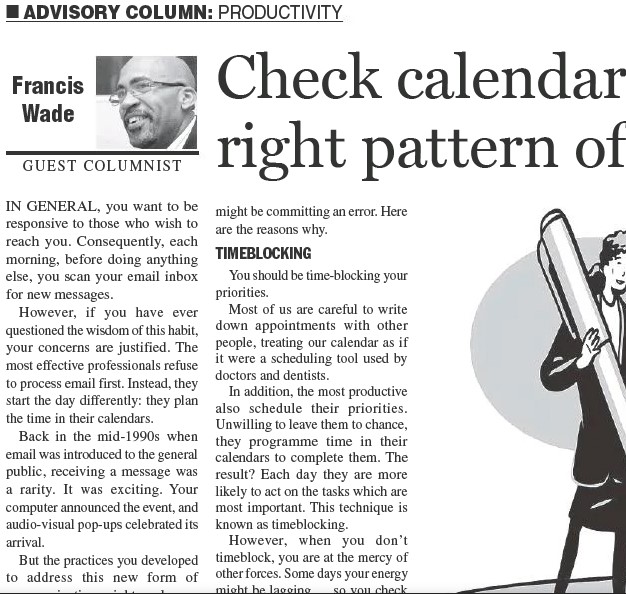In general, you want to be responsive to those who wish to reach you. Consequently, each morning, before doing anything else, you scan your email inbox for new messages. However, if you have ever questioned the wisdom of this habit, your concerns are justified. The most effective professionals refuse to process email first. Instead, they start the day differently: they plan the time in their calendars.
Back in the mid-1990s when email was introduced to the general public, receiving a message was a rarity. It was exciting. Your computer announced the event, and audio-visual pop-ups celebrated its arrival.
But the practices you developed to address this new form of communication may no longer work. Why? They were suitable for a handful of messages, but useless for the 100+ deluge we face today.
One habit you may have adopted is the first-thing-in-the morning-check. If you’re opening email as the initial task upon entering the office, jumping in the car or sitting up in bed in your pajamas, you may be committing an error. Here are the reasons why.
- You should be timeblocking your priorities
Most of us are careful to write down appointments with other people, treating our calendar as if it were a scheduling tool used by doctors and dentists.
In addition, the most productive also schedule their priorities. Unwilling to leave them to chance, they program time in their calendars to complete them. The result? Each day they are more likely to act on the tasks which are most important. This technique is known as timeblocking.
However, when you don’t timeblock, you are at the mercy of other forces. Some days your energy might be lagging… so you check social media. On others, you may be feeling a lack of motivation… so you focus on routine actions.
Left to chance, it’s easy to miss deadlines because your work is being driven by factors unrelated to the importance of the task and its urgency.
Even so, as ruinous as these internal factors are, the worst culprit of all is the email you receive from others.
- How colleagues control you with messages
Too many people accept a passive role in their jobs. In other words, they see themselves as good soldiers whose job it is to take orders. In extreme cases, often with younger staff, they only aspire to make others happy.
If you’re in this cohort, email is a fantastic way for other people to transmit their priorities. Your assignment? Simply answer as many messages as fast as possible, and do what they tell you to do. Consequently, they give you more to do… which increases your email volume. The faster you respond, the more you get.
With this mindset, it’s only natural for you to check your inbox as soon as you can in the morning. If you never break the habit, you end up spending the better part of the day at the mercy of others who are happy to overlay their priorities over yours.
Unfortunately, while some encourage this practice, it’s not sustainable. To climb the corporate ladder, a person needs to show increasing self-direction and intrinsic motivation. In other words, they must lead, not follow.
Doing so means letting go of the anxiety felt when you haven’t replied to someone immediately.
This inner turmoil which leads to feelings of overwhelm has a name: The Zeigarnik Effect. There’s no way to climb the corporate ladder without learning to manage it.
- By the end of the day, you have accomplished little
We all know that person in the office who is very busy with email, but seldom accomplishes much. Often, they appear exhausted.
You may think they are simply being lazy, but here’s a simpler explanation. They are failing to examine the habits, practices and routines picked up in adolescence. Therefore, they become stuck.
The antidote is to exercise relentless, continuous improvement in your task management. For example, checking your calendar before your email inbox each day is not a popular habit among Jamaican workers.
However, by seeking out best practices and experimenting with them, you can be as productive as anyone else in the world. At the highest levels, professionals accomplish both productivity and peace of mind. The key? High performance in core areas such as task management, even when your friends, family and colleagues don’t act as role models.
If you’re serious, bypass the conventional wisdom. Drive each day using the priorities written in your timeblocked calendar. This best practice (and others) will help you become someone who has both peace of mind and productivity. You’ll be striving to find the right answers to greater personal capacity.
Francis Wade is the host of the Caribbean Strategy Conference on June 23-25. To search his prior columns on productivity, strategy, engagement and business processes, send email to columns@fwconsulting.com.

